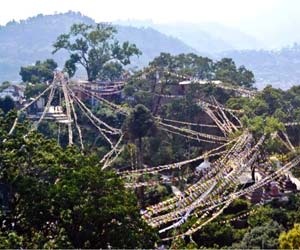|
 So I wanted to dedicate one post on some cultural facts I discovered while experiencing my time in Nepal. After almost a week here, I think I'm ready to share with everyone the interesting and sometimes peculiar things that astonished me whilst observing Nepal. So I wanted to dedicate one post on some cultural facts I discovered while experiencing my time in Nepal. After almost a week here, I think I'm ready to share with everyone the interesting and sometimes peculiar things that astonished me whilst observing Nepal.
1) Men are very overtly affectionate with one another: It is very common to see men here holding hands (sometimes fingers laced) and putting their arm around another. While I knew this was a cultural phenomenon in many parts of the world (according to Westerners of course), I was nonetheless a bit shocked to see this in person.
2) There is apparent price discrimination for foreigners. I have been told that what foreigners pay here, Nepalis pay about 50% lower. That being said, there are no real fixed prices on Nepali goods; only ones that are bargained for. I'm beginning to realize this and subsequently am attempting to build up confidence and trickery while trying to find a price I'm satisfied with.
3) I've lost count of how many times I've been offered weed here: Take a walk into the Thamel district of Kathmandu and your bound to have at least a few sketchy individuals ask if you want to buy weed. Kindly say no and walk away as quickly as possible I found is the best strategy.
4) Kathmandu is chunk full of pollution. From the skies to the ground itself, pollution is rampant here. I have been told by my friends it would be wise to wear a protective facial mask while walking around Kathmandu since the pollution is that bad. So, following their advice, I went out and bought one today (although I look really creepy with sunglasses and black mask on but I guess it'll be beneficial for my well being) While the mountains from the valley should be plainly visible, there is a haze that clouds over the city that makes viewing the mountains a strenuous activity.
5) A bus ride outside the city is both spectacular and frightening. A paradox of emotions, the bus rides in the rural parts of Nepal offer some of the most breathtaking mountain views you will ever see in your life. Not only do you see lush green mountains tower around you, but you also get to view the intriguing rural village people that live life on the mountains. While the charm of village life is certainly intoxicating, there is an expense. Because the terrain is so rough, the bus ride can be treacherous and scary. There are little to no guard rails and there is only one lane which means the bus constantly has to be aware for incoming traffic. Seeing a group of people gathered around a fallen vehicle during my first rural bus ride was definitely did not ease my spirits. Despite that, however, these bus drivers are extremely well trained and are incredibly good at what they do. I cannot even begin to imagine the life of a bus driver in Nepal but the bus driver must always be alert. Also, horns are second nature here and for good reason. The bus driver rings a incredibly loud horn to single his passing. Additionally, there are many landslides in the country side areas which offer another obstruction to driving. My bus ride to the bungee jumping place was by far the most bumpiest ride I ever took.
6) The people here are incredibly warm, friendly and humble: For example, today me and my friends were walking around the Thamel district looking to go to the popular Durbar Square ('Durbar' means Temple in Nepalese) We stopped into a shop to look around and my friend decided to buy an awesome shirt. We had an amazing conversation with the clerk and he randomly asked us if we wanted to attend a Nepali wedding, as his brother was soon to be wed. Startled at this offer, we kind of stood there confused but asked when it was. It turns out that, unfortunately, my friends with me would be gone during the time of the wedding but I would still be there. So, I happily accepted the offer and he added me on Facebook to contact me more about it. Astounded that somebody would ask a complete stranger to attend their brothers wedding, I was even more shocked with what happened after. My friend went back in the store to ask him for directions to Durbar Square. Instead, he had his brother drive us for free to the square (which turned out to be a long walk from the view from the car!) I thought to myself, you would seldom find such acts of kindness and openness back at home (Don't get me wrong I'm sure there are great people in the states too!)
7) The military presence is very high here in Nepal, especially in the more rural parts of the country. I just recently learned that Nepal is coming out of a relatively recent civil war (1996-2006) which lasted a decade. After 13,000 deaths and thousands more missing children, the country is still in recovery mode and still alert in case of any insurgent reawakening. Basically, the country was split into civil war when the Maoist rebels fiercely advocated for their version of communism to be implemented on the political apparatus in Nepal. The somewhat democratic government resisted and the country was plunged into widespread domestic violence. Even today, the feeling of war can be felt. When I went into the country, the bus had to go through a number of military checkpoints in which soldiers entered the bus and looked around and also looked in the trunk for suspicious material. I feel really intrigued by this and am looking forward to learning more about the civil war considering a high influx of orphans was a detrimental by product of the war.
 8) The prices here are extraordinarily cheap compared to Western standards. A meal at a restaurant should normally cost you less than 5$ while in the States it might cost you around $10. You can find most clothes here for less than $10 and the more you travel away from the touristy destinations, the cheaper you'll find things. 8) The prices here are extraordinarily cheap compared to Western standards. A meal at a restaurant should normally cost you less than 5$ while in the States it might cost you around $10. You can find most clothes here for less than $10 and the more you travel away from the touristy destinations, the cheaper you'll find things.
9) When observing other foreigners around Kathmandu I began to realize you can categorize them into three general groups of people. The majority being, the hippies. Usually rocking the dreadlocks, these people just scream hippie style with their oversized pants, hemp clothing, and laid back persona. I imagine they are here since a lot of the hippie culture in the states seems to be derived from South Asian-Indian influences. There are also the trekkers who are rocking their north face backpacks and trekking gear and you can just guess they are here for a long tumultuous trek through the Himalayas. And then there are us! The volunteers! We usually just look like your regular American with no real unique fashion sense the hippie-like folk seem to posses. But I assure you, we're just as great!
10) According to my friend Maggie who is working with a Women's rights organization here in Kathmandu, there is rampant discrimination and abuse of women here in Nepal. There seems to be a general sub-ordinance women are "naturally" born with in the eyes of some Nepali. For example, women are under extreme pressure to get married. Being married here is considered one of the most valuable aspects of your life and if your not married you are to be ostracized from society. Even if your husband willingly leaves you or even dies, a widow and/or single mother is seen as extremely taboo in Nepali society. Nepali women also express their marital status through their clothing. There are specific colors that indicate different statuses in society. In addition, considering the Indian/Hindu influence, the caste system is equally as prevalent. Apparently, there exists a lot of discrimination and class-warfare between different caste groups. Considering the level of poverty here, its easy to see how people might become violent with things like this.
11) The bathroom situation here is quite unique, to say the least. Nepali people normally wipe themselves with their left hands which subsequently makes doing things with ones left hand taboo. It is considered a body part that is dirty which is obvious seeing that they use that bear hand to wipe themselves. Fortunately, they do sell toilet paper here which I bought since I see no way for me to adjust to wiping myself with my hand...The thought of that just makes me cringe but hey it's not my culture so live and let live.
12) As in Islamic cultures, showing the bottoms of your feet here and pointing are considered unfathomably rude in Nepali culture. From what I remember, I've done my best to avoid the first one but pointing is so common to me that it might be a challenge to suppress the urge to do so.
13) Tourism plays a huge role in the Nepali economy. Just walking through the Thamel district and you'll see hundreds upon hundreds of signs for trekking, kayaking, canyoning, bungee jumping, elephant riding, trips to Tibet and Bhutan, etc. Nepal flourishes in tourism and probably would be in a much more impoverished state without it. So while at times I may feel like a silly typical tourist with my camera and naivety, at least I know it's going somewhere.
OK, so I'll stop there since I just realized how much I wrote and don't want to bore you all with too many of my thoughts and retrospections. I know some of this sounds like Nepal is a bad place but PLEASE DO NOT be misconstrued. This place has so much to offer despite some of the things I mentioned. Life here is like nothing I ever experienced and could not be more ecstatic to be living here and digesting it all one by one.
Till later,
Namaste
Visit Timothy's blog
|
 So I wanted to dedicate one post on some cultural facts I discovered while experiencing my time in Nepal. After almost a week here, I think I'm ready to share with everyone the interesting and sometimes peculiar things that astonished me whilst observing Nepal.
So I wanted to dedicate one post on some cultural facts I discovered while experiencing my time in Nepal. After almost a week here, I think I'm ready to share with everyone the interesting and sometimes peculiar things that astonished me whilst observing Nepal. 8) The prices here are extraordinarily cheap compared to Western standards. A meal at a restaurant should normally cost you less than 5$ while in the States it might cost you around $10. You can find most clothes here for less than $10 and the more you travel away from the touristy destinations, the cheaper you'll find things.
8) The prices here are extraordinarily cheap compared to Western standards. A meal at a restaurant should normally cost you less than 5$ while in the States it might cost you around $10. You can find most clothes here for less than $10 and the more you travel away from the touristy destinations, the cheaper you'll find things.
